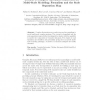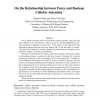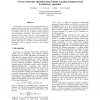62 search results - page 3 / 13 » Minimizing Complexity in Cellular Automata Models of Self-Re... |
ICCS
2007
Springer
13 years 11 months ago
2007
Springer
Complex Automata were recently proposed as a paradigm to model multi-scale complex systems. The concept is formalized and the scale separation map is further investigated in relati...
JAC
2008
13 years 6 months ago
2008
Cellular automata are a simple model of parallel computation. Many people wonder about the computing power of such a model. Following an idea of S. Wolfram [16], M. Cook [3] has pr...
JGS
2000
13 years 4 months ago
2000
GIS and spatial analysis is suited mainly for static pictures of the landscape, but many of the processes that need exploring are dynamic in nature. Dynamic processes can be comple...
TCS
2011
12 years 11 months ago
2011
Fuzzy cellular automata (FCA) are continuous cellular automata where the local rule is defined as the “fuzzification" of the local rule of a corresponding Boolean cellula...
HIS
2004
13 years 6 months ago
2004
In this paper, a new fuzzy clustering algorithm that uses cellular learning automata based evolutionary computing (CLA-EC) is proposed. The CLA-EC is a model obtained by combining...



